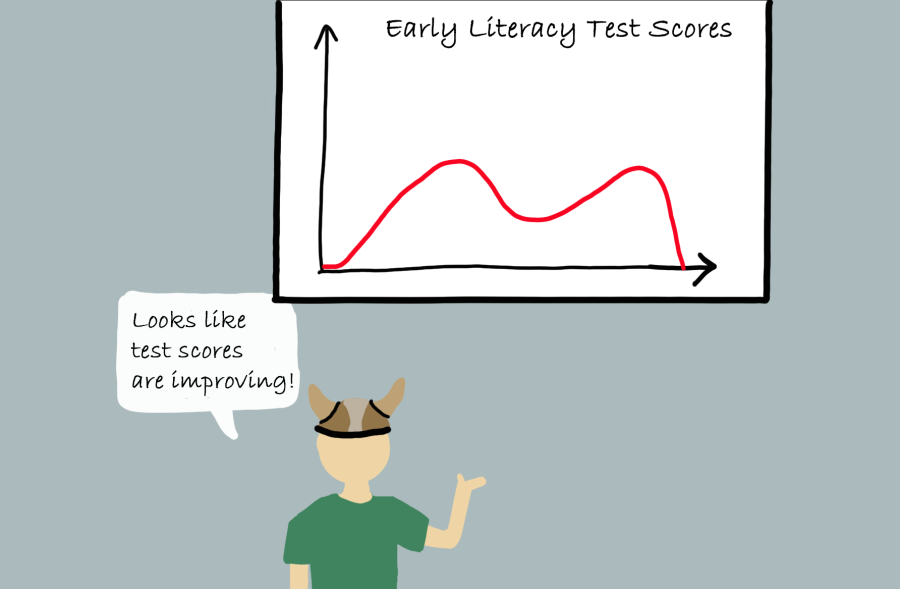To help improve the reading level of elementary students who have fallen behind due to online school during the pandemic, PAUSD launched the Every Student Reads Initiative last year. Their main goal was to increase the percent of third graders who meet or exceed the English Language Arts standard on the California Assessment of Student Performance and Progress test by at least 3%.
Superintendent Don Austin told the school board in September that the district had exceeded its goal of a three-point increase compared to 2019 in the percent of all students who read at or above the state standard.
Scores for students specifically targeted by the Every Students Reads Initiative — mainly low-income, disabled and LatinX students — showed larger increases of 15.8%, 16% and 8.6%, respectively.
However, PAUSD parents have raised concerns that the district may be misusing data, especially because reading scores for most of the country have fallen due to the pandemic.
The Campanile thinks PAUSD should provide more transparency when sharing data about student performance and focus on supporting all students by improving its reading programs in accordance with teachers’ suggestions.
While the district’s report on reading achievement showed the three-point improvement, the Report on 2022 Literacy Results published online by two PAUSD parents, clinical neuropsychologist Allyson Rosen and computer science professor Edith Cohen, said this improvement is not significant enough to statistically prove the district’s literacy program is a success.
According to the parents’ report, a 3% improvement in scores has a 37% probability of occurring without any changes to teaching, suggesting the results have little statistical significance and are more accurately attributed to luck than the district’s new reading program.
Furthermore, the results from the ELA portion of the CAASPP test for PAUSD elementary schools do not show a clear trend in reading performance and trends are not consistent across the district’s 12 elementary schools.
For example, the percent of Walter Hayes students who met or exceeded the standard for ELA increased by 3.75% from 2018 to 2019 but decreased by 8.16% in 2021 and decreased another 1.74% in 2022. The percent of Addison Elementary students who met or exceeded the standard for ELA, meanwhile, decreased by 3.97% from 2018 to 2019, increased by 4.65% in 2021 and decreased by 1.01% in 2022. Results for 2019-2020 were not reported because testing was suspended that year due to the COVID-19 pandemic.
Because scores have gone up and down by a few points for many years without the Every Student Reads Initiative, a 3% increase is not a large enough change to conclude that the district’s elementary school reading rates have improved, nor a large enough increase to praise the success of a new reading program.
In addition, while reading rates may have shown some improvement, the number of historically low-performing students who attend PAUSD schools decreased by 38% from 2019 to 2022, according to the two PAUSD parents’ report, suggesting artificial manipulation of the data through exclusion and discrimination.
Besides transparency issues, PAUSD has been inconsistent with its curriculum selection. According to a Palo Alto Online article from May, the board of education voted to adopt a new reading curriculum, the Benchmark Advance/ Adelante Program, for the 2022-2023 school year without any obvious reason and despite substantial opposition from the English Language Arts Pilot and Adoption Committee, composed of parents, teachers, specialists and administrators from all elementary schools and grade levels.
Teachers said the Benchmark Advance/Adelante Program does not adequately serve disadvantaged students, especially those with Individualized Educational Plans, because of its onesize-fits-all philosophy.
While the district says its new curriculum will support underserved students and champions the success of the Every Student Reads Initiative, this assumption appears to be built on manipulated data.
The Campanile thinks taking shortcuts that prioritize the district’s image over equity in education is unacceptable, especially because reading is a basic skill everyone needs to lead a fulfilling life. PAUSD should report transparent data and use this data alongside input from teachers about the type and execution of curriculum to provide an effective education for all students.

